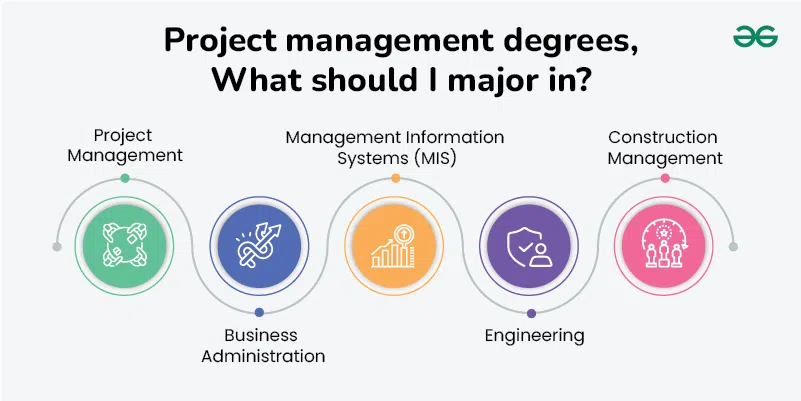Introduction
In today’s fast-paced business environment, organizations rely on skilled project managers to lead teams, optimize resources, and deliver successful outcomes. A Project Management Degree equips professionals with the knowledge, tools, and techniques needed to oversee projects efficiently across industries such as IT, construction, healthcare, and finance.
This article explores the benefits of earning a project management degree, the core curriculum, career opportunities, and why it’s a valuable investment for aspiring leaders.
What is a Project Management Degree?
A Project Management Degree is an academic program designed to teach students how to plan, execute, monitor, and close projects effectively. These programs are available at undergraduate (Bachelor’s) and graduate (Master’s or MBA) levels, as well as through certifications like PMP (Project Management Professional).
Types of Project Management Degrees:
-
Bachelor’s in Project Management – Covers fundamentals such as scheduling, budgeting, risk management, and team leadership.
-
Master’s in Project Management (MPM) – Advanced training in strategic project leadership, Agile methodologies, and stakeholder management.
-
MBA with a Project Management Specialization – Combines business administration with project management skills.
-
Certifications (PMP, CAPM, PRINCE2) – Short-term credentials that validate expertise and enhance career prospects.
Core Subjects in a Project Management Degree
A well-structured program typically includes:
-
Project Planning & Scheduling – Gantt charts, Critical Path Method (CPM), and Work Breakdown Structure (WBS).
-
Budgeting & Cost Control – Financial forecasting, resource allocation, and cost-benefit analysis.
-
Risk Management – Identifying, assessing, and mitigating project risks.
-
Agile & Scrum Methodologies – Popular frameworks for IT and software development projects.
-
Leadership & Communication – Team dynamics, conflict resolution, and stakeholder engagement.
-
Quality Management – Ensuring deliverables meet industry standards (Six Sigma, Lean).
Why Pursue a Project Management Degree?
1. High Demand for Project Managers
According to the Project Management Institute (PMI), employers will need 25 million new project professionals by 2030. Industries like IT, construction, and healthcare are actively hiring certified project managers.
2. Competitive Salaries
-
Entry-Level Project Manager: $60,000 – $80,000
-
Mid-Level (PMP Certified): $90,000 – $120,000
-
Senior/Director Roles: $130,000+
(Source: PMI Salary Survey, 2023)
3. Career Flexibility
Project management skills apply across sectors, including:
-
IT & Software Development (Agile/Scrum)
-
Construction & Engineering
-
Healthcare Administration
-
Finance & Consulting
-
Government & Nonprofits
4. Enhances Leadership & Problem-Solving Skills
A degree in project management sharpens critical thinking, negotiation, and decision-making abilities—essential for leading teams and driving success.
Top Universities Offering Project Management Degrees
Some of the best institutions for project management education include:
-
University of Texas at Dallas (USA) – MS in Project Management
-
University of Oxford (UK) – MSc in Major Programme Management
-
RMIT University (Australia) – Master of Project Management
-
George Washington University (USA) – MBA in Project Management
Online vs. On-Campus Programs
| Factor | Online Degree | On-Campus Degree |
|---|---|---|
| Flexibility | ✅ Study remotely | ❌ Fixed schedule |
| Networking | Limited | Strong peer connections |
| Cost | Often cheaper | Higher tuition + living expenses |
| Hands-on Learning | Virtual simulations | Real-world case studies |
Certifications to Boost Your Degree
While a degree provides foundational knowledge, certifications enhance credibility:
-
PMP (Project Management Professional) – Gold standard for experienced managers.
-
CAPM (Certified Associate in Project Management) – Entry-level certification.
-
PRINCE2 (Projects in Controlled Environments) – Popular in Europe.
-
Scrum Master (CSM) – For Agile project environments.
Career Paths with a Project Management Degree
Graduates can pursue roles such as:
-
Project Coordinator → Project Manager → Senior PM → Program Manager → Director of Project Management
-
Consultant – Advising businesses on project efficiency.
-
Entrepreneur – Managing startups and business ventures.
Conclusion: Is a Project Management Degree Worth It?
Yes! A Project Management Degree provides structured training, industry-recognized credentials, and access to high-paying jobs. Whether you’re a recent graduate or a working professional, this degree can accelerate your career growth and open doors to leadership opportunities.
Next Steps:
-
Research accredited programs.
-
Consider certifications (PMP, Agile).
-
Gain hands-on experience through internships.
By investing in a project management education, you position yourself as a strategic leader capable of driving organizational success.
Visit our website:




